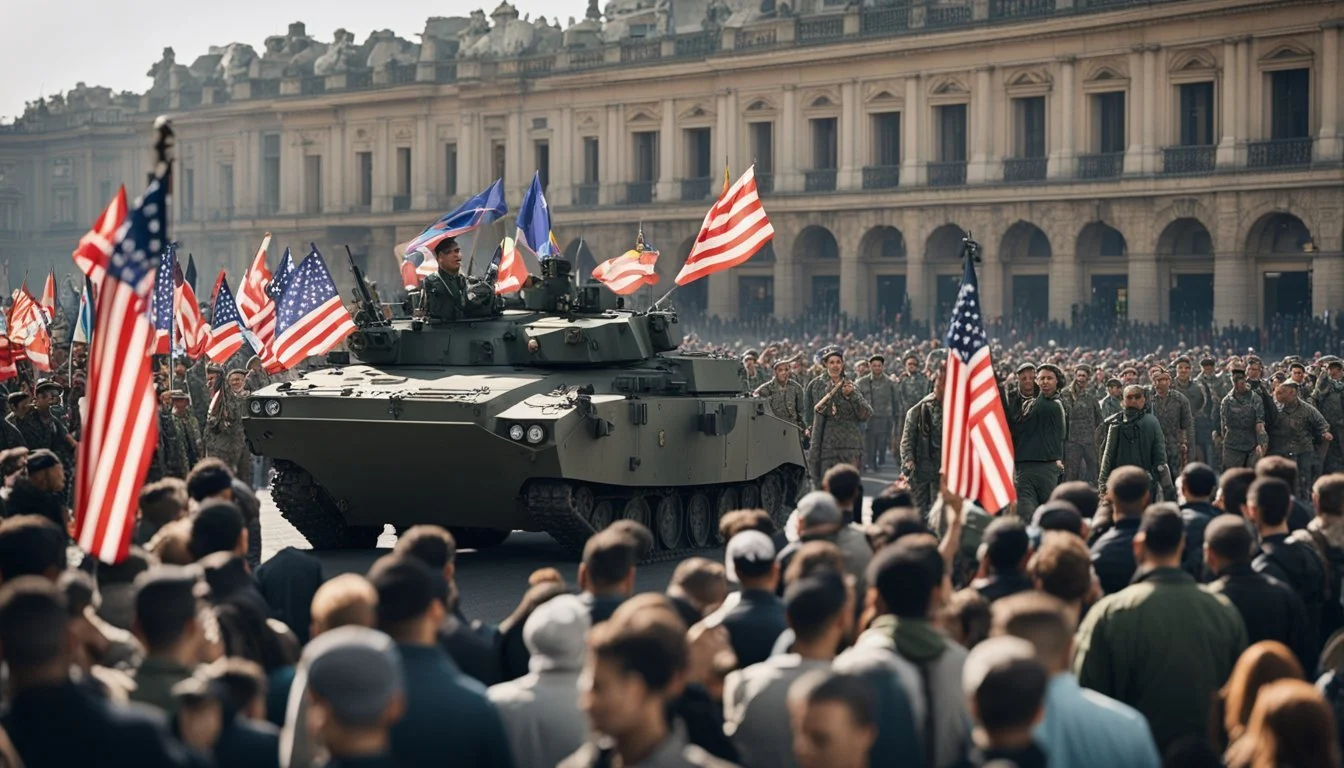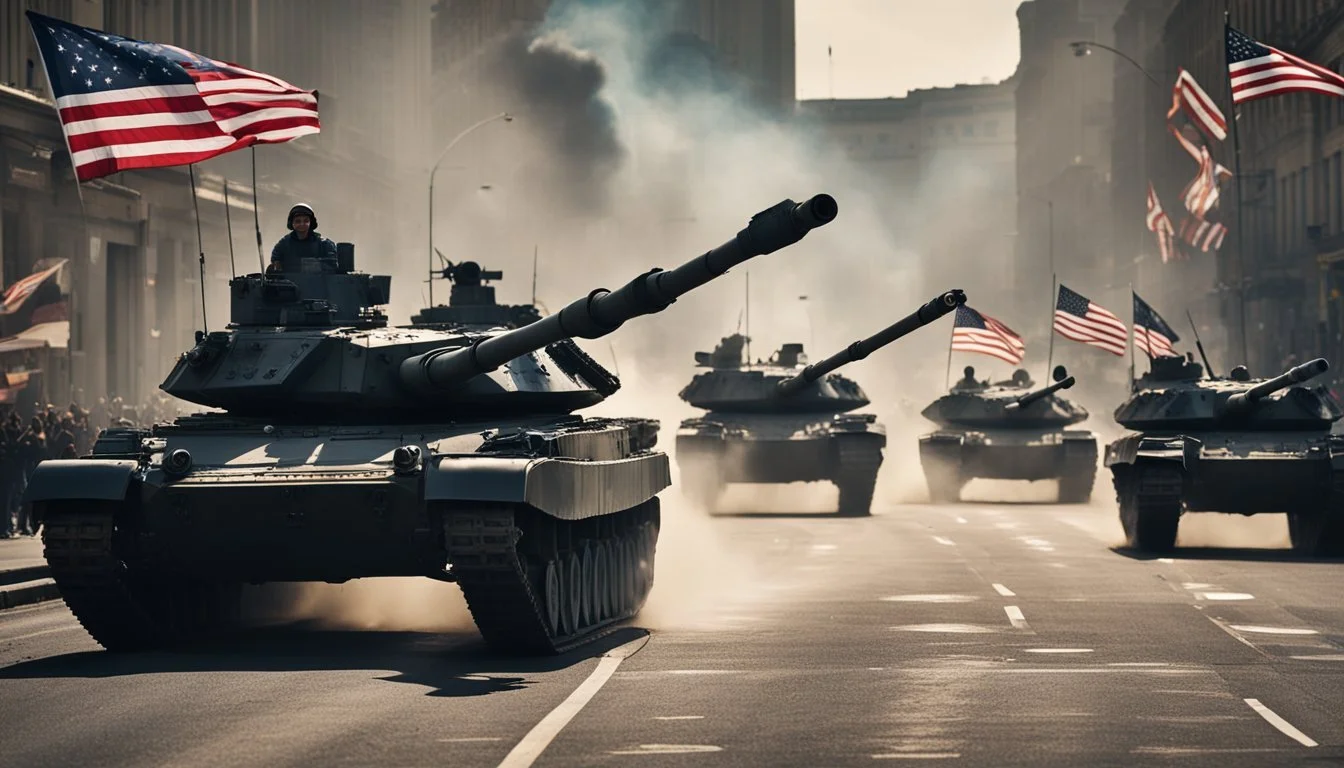7 Films About Political Coups
Riveting Cinema on Turbulent Overthrows
Films about political coups offer a gripping look into the tumultuous and often clandestine world of government overthrow. These films delve into the intricate plots, personal sacrifices, and high stakes involved in power struggles that can change the course of a nation’s history. They serve as a stark reminder of the fragility of political structures and the lengths to which individuals will go to seize control.
Why should you care about films depicting political coups? These movies not only entertain but also provide valuable insight into historical events and political dynamics. They often highlight the complexities and moral ambiguities faced by those involved, offering a nuanced perspective on what it means to challenge established authority.
1) JFK (Oliver Stone) (1991)
Directed by Oliver Stone, JFK is a political thriller that dissects the investigation into President John F. Kennedy's assassination. The film centers on New Orleans district attorney Jim Garrison, portrayed by Kevin Costner, who challenges the official narrative.
Garrison's relentless pursuit uncovers evidence suggesting a conspiracy behind the assassination, casting doubts on Lee Harvey Oswald's role as the lone gunman.
The film is known for its detailed and intense portrayal of political deception. It examines various angles, including CIA involvement, military-industrial interests, and potential cover-ups within the government.
Stone's direction, combined with a star-studded cast, makes JFK a compelling film that has significantly influenced public opinion on the assassination. It sparked debates and fueled conspiracy theories still discussed today.
For more information, visit the Wikipedia page for JFK.
2) Z (Costa-Gavras) [1969]
"Z," directed by Costa-Gavras, is a gripping political thriller that examines the tumultuous political landscape of 1960s Greece. Based on the novel by Vassilis Vassilikos, the film follows the events surrounding the assassination of leftist politician Grigoris Lambrakis.
The film presents a thinly veiled recounting of real-life events, revealing the corruption and brutality within the Greek government and military forces.
Yves Montand stars as the ill-fated politician, with Jean-Louis Trintignant playing the investigating magistrate striving for justice. Costa-Gavras's direction ensures an intense, fast-paced narrative.
"Z" received critical acclaim, winning an Academy Award and becoming a significant piece of political cinema. Its powerful depiction of political intrigue and societal unrest resonated globally.
For more information on the film, visit Wikipedia.
3) The Conformist (Bernardo Bertolucci) [1970]
"The Conformist," directed by Bernardo Bertolucci, explores the psychological and political journey of a man in 1930s Italy. The film is based on Alberto Moravia's 1951 novel. Jean-Louis Trintignant stars as Marcello Clerici, a government official who conforms to fascist ideologies.
Marcello is tasked with assassinating his former professor, now a dissident. The film delves into the complex themes of conformity, political power, and personal morality. Set against the backdrop of Italy's fascist regime, it paints a vivid picture of the time.
The cinematography by Vittorio Storaro is noteworthy for its stunning visual composition. The film employs a rich tapestry of artistic and cinematic techniques. It's an example of how visual style can enhance narrative depth.
For more information on this film, visit IMDb.
4) All the President's Men (Alan J. Pakula) (1976)
Alan J. Pakula directed All the President's Men, a film that delves into the Watergate scandal. This 1976 political thriller is based on the book by journalists Carl Bernstein and Bob Woodward.
Dustin Hoffman and Robert Redford bring the roles of Bernstein and Woodward to life. Their portrayal captures the intense investigation that uncovered the complex web of political corruption.
The film highlights the crucial role of journalism in holding power accountable. It provides a meticulous look at the investigative process, showcasing the determination and risks taken by the reporters.
With a screenplay by William Goldman, the movie combines suspense with factual reporting. It remains a significant work in the genre of political thrillers, reflecting the events that led to President Nixon's resignation.
For more information, visit the Wikipedia page.
5) The Battle of Algiers (1966, Gillo Pontecorvo)
"The Battle of Algiers," directed by Gillo Pontecorvo, is a landmark war film set during the Algerian War of Independence. It captures the intense struggle between Algerian rebels and French colonial forces from 1954 to 1962.
Shot in a realistic, documentary style, the film depicts key moments of the conflict. These include urban guerrilla warfare, bombings, and the widespread use of torture by French soldiers.
Jean Martin and Saadi Yacef feature prominently in the film. Yacef, who was an actual leader in the Algerian National Liberation Front (FLN), lends an air of authenticity to the depiction of events.
Praised for its raw and unflinching portrayal of war and its impact on civilians, the film is often studied for its technique and subject matter. It shows the complexities and moral ambiguities of anti-colonial struggles.
Pontecorvo's film remains influential in both cinema and political discourse. It is regarded as a significant work that captures the brutal realities and human cost of war.
For more information, visit the Wikipedia page on The Battle of Algiers.
6) Missing (Costa-Gavras) [1982]
Directed by Costa-Gavras, "Missing" is a powerful film that dramatizes the disappearance of American journalist Charles Horman during the 1973 coup in Chile. The movie stars Jack Lemmon and Sissy Spacek as Horman's father and wife, respectively, who relentlessly search for him amidst political turmoil.
Costa-Gavras is renowned for his politically charged films, and "Missing" is no exception. The film critically examines the role of the U.S. government and its complicity in the Chilean coup, making it a highly controversial piece upon its release.
The screenplay, co-written by Costa-Gavras and Donald E. Stewart, is adapted from Thomas Hauser's book "The Execution of Charles Horman: An American Sacrifice." This adds a layer of historical authenticity to the film, grounding its fictionalized elements in real events.
The performances by Lemmon and Spacek are emotionally intense, conveying the personal heartache linked to the broader political issues. The film won the Palme d'Or at the Cannes Film Festival and an Academy Award for Best Adapted Screenplay, cementing its place in cinematic history.
More information can be found here.
7) The Last King of Scotland (Kevin Macdonald) [2006]
"The Last King of Scotland," directed by Kevin Macdonald, is a gripping historical drama. The film, released in 2006, is based on Giles Foden's 1998 novel of the same name. It tells the brutal story of Ugandan dictator Idi Amin's regime.
Forest Whitaker delivers a powerful performance as Idi Amin. His portrayal earned him an Academy Award for Best Actor. The story is seen through the eyes of Nicholas Garrigan, a fictional Scottish doctor played by James McAvoy.
The film explores the political dynamics during Amin's rule. It highlights his initial charm and the subsequent descent into tyranny. The narrative effectively uses Garrigan's perspective to witness the horrors and complexities of Amin's dictatorship.
Significant historical events, such as Amin's coup and the Entebbe raid, are depicted. The film combines factual and fictional elements to create a compelling narrative.
For more information about "The Last King of Scotland," visit the Wikipedia page.
Historical Context of Political Coups
Political coups have occurred throughout history as forceful means of changing government structures, often bypassing legal frameworks.
Defining Political Coups
A political coup, or coup d'état, typically involves the sudden and illegal overthrow of a government, often orchestrated by a small group. Fundamentally, it seeks a rapid transfer of power, sidestepping traditional legal processes.
Coups can be either violent or non-violent, depending on the strategies and the resistance faced. Crucial elements include secrecy, speed, and control over key institutions. Historically, military figures play significant roles, leveraging their command structure and resources to capture governmental authority.
Major Historical Examples
One of the most well-known coups is the Chilean coup of 1973, where General Augusto Pinochet ousted President Salvador Allende. This event marked a significant shift in Chile's political landscape, leading to years of military dictatorship.
In Africa, the Ugandan coup of 1971 saw General Idi Amin seize power from Milton Obote, impacting Uganda's history profoundly. Another notable example is the 2019 Bolivian political crisis, where Evo Morales resigned following military pressure amidst contested election results.
These examples underscore the impact and frequency of coups, highlighting their role in altering political trajectories and shaping national histories.
Political Coups in Cinema
Political coups have been a compelling subject in films, reflecting underlying themes of power, corruption, and resistance. These movies often present gripping narratives that resonate deeply with audiences.
Themes and Narratives
Films about political coups frequently explore the power dynamics at play. Characters such as military leaders, political figures, and ordinary citizens find themselves caught in tumultuous events. Themes such as betrayal, loyalty, and idealism are commonly depicted.
For example, "The Last Emperor" focuses on the fall of Pu-Yi during China’s political upheaval, reflecting the tension between tradition and revolutionary fervor. Similarly, "Seven Days in May" portrays the extreme measures taken by military leaders within a democratic society.
Impact on Audiences
These movies often have a profound impact on audiences. By showcasing the dramatic consequences of power struggles, they provoke reflection on political stability and ethical governance. Films like "The Parallax View" highlight how mistrust in government can influence public perception.
Political thrillers such as "The Last King of Scotland" make a significant emotional connection by humanizing historical figures and immersing viewers in the personal costs of political turmoil. By blending factual events with engaging storytelling, these films foster a deeper understanding of the complexities involved in political coups.
Analyzing Cinematic Techniques
Films about political coups often employ various cinematic techniques to enhance their narratives. These techniques can be crucial in conveying the underlying messages and themes of power struggles and societal upheavals.
Use of Symbolism
Symbolism serves as a powerful tool to deepen the narrative impact of films about political coups. Directors often use color schemes, recurring objects, and visual metaphors to represent larger political and social themes. For example, in The Conformist, Bernardo Bertolucci utilizes stark contrasts between light and shadow to emphasize themes of fascism and moral ambiguity.
In Z, Costa-Gavras employs symbols like newspapers and typewriters to illustrate the power of information and the press in the context of a coup. The use of specific items, such as a broken watch, might represent the disruption of time and order, adding layers of meaning to the cinematic experience.
Depiction of Power Dynamics
Cinematic techniques are essential in portraying the shifting power dynamics inherent in political coups. Camera angles and positioning play a significant role in expressing dominance and submission. Low-angle shots can give a sense of authority and power to leaders or dictators, while high-angle shots may portray oppressed or subjugated individuals or groups.
Editing choices, such as quick cuts during intense sequences, can convey chaos and tumult, mirroring the real-life instability of a coup. In The Battle of Algiers by Gillo Pontecorvo, handheld camera work and documentary-style filming create an immediate and immersive sense of realism, highlighting the tension between insurgent forces and the established regime.








